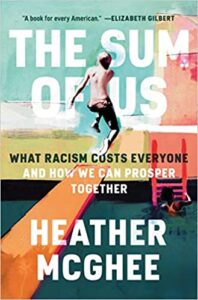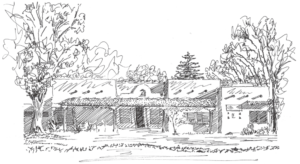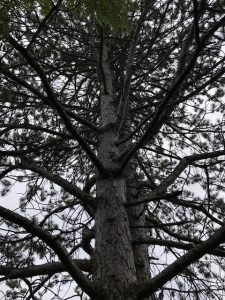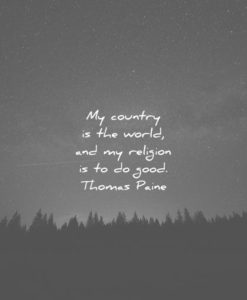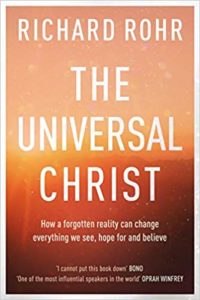Howard Thurman
Past and Present. A community dialogue.
February 21, 2021To understand the world knowledge is not enough, you must see it, touch it, live in its presence.
—Teilhard de Chardin, Hymn of the Universe
The American Lie.
No. Not the election.
The big lie in the United States is racism only effects people of color.
Heather McGhee’s book is brilliant. She is brilliant. Her book is incredibly researched and synthesized. A must read book for every journalist, politician, policy creator, and student. Actually, you know what? Everyone should read Heather’s book. And she speaks like she writes, clearly, foundationally, and directly. We need to listen. -dayle
NPR/Fresh Air
The heart of McGhee’s case is that racism is harmful to everyone, and thus we all have an interest in fighting it. Drawing on a wealth of economic data, she argues that when laws and practices have discriminated against African Americans, whites have also been harmed. When people unite across racial and ethnic lines, she argues, there’s a solidarity dividend that helps everyone.
Heather McGhee is the former president of the progressive think tank Demos, where she spent much of her career. She holds a BA in American Studies from Yale and a law degree from the University of California, Berkeley. She currently chairs the board of Color of Change, a nationwide online racial justice organization. Her new book is “The Sum Of Us: What Racism Costs Everyone And How We Can Prosper Together.”
Heather McGhee:
This to me is really the kind of parable at the heart of the book. It’s what’s illustrated on the cover. In the 1920s, ’30s and ’40s, the United States went on a building boom of these grand resort-style swimming pools. These were the kind that would hold hundreds, even thousands, of swimmers. And it was a real sort of Americanization project. It was to create a, like, bath-temperature melting pot of, you know, white ethnic immigrants and people in the community to come together. It was sort of a commitment by the government to a leisure-filled American dream standard of living. And in many of these public pools, the rule was that it was whites only, either officially or unofficially. And in the 1950s and ’60s when Black communities began to, understandably, say, hey, it’s our tax dollars that are helping to support this public good, we need to be allowed to swim, too, all over the country, particularly in the American South but in other places as well, white towns facing integration orders from the courts decided to drain their public swimming pools rather than let Black families swim, too.
Now, I went to Montgomery, Ala., where there used to be one of those grand resort-style pools and where effective January 1, 1959, not only did they back a truck up and pour dirt into the pool and pave it over, but they also sold off the animals in the municipal zoo. They closed down the entire parks and recreation department of Montgomery for a decade. It wasn’t until almost 1970 that they reopened the park system for the entire city. And I walked the grounds of Oak Park. Even after they reopened it, they never rebuilt the pool. And that, to me, felt like this just tangible symbol of the way that a population taught to distrust and disdain their neighbors of color will withdraw from public goods when they no longer see the public as good.
Interview with Dave Davies on NPR:
https://www.npr.org/2021/02/17/968638759/sum-of-us-examines-the-hidden-cost-of-racism-for-everyone
The Daily Show with Trevor Noah
“The Sum of Us,” and underlines the importance of having honest conversations about past and present racism at a community level.
Ezra Klein/NYTimes
What ‘Drained-Pool’ Politics Costs America
I asked McGhee to join me on my podcast, “The Ezra Klein Show,” for a discussion about drained-pool politics, the zero-sum stories at the heart of American policymaking, how people define and understand their political interests, and the path forward. This is, in my view, a hopeful book, and a hopeful conversation. There are so many issues where the trade-offs are real, and binding. But in this space, there are vast “solidarity dividends” just waiting for us, if we are willing to stand with, rather than against, each other.
Also from the NYTimes.
opinion
The book That Should Change How Progressives Talk About Race
Heather McGhee writes that racism increases economic inequality for everyone.
by Michelle Goldberg
McGhee’s book is about the many ways racism has defeated efforts to create a more economically just America. Once the civil rights movement expanded America’s conception of “the public,” white America’s support for public goods collapsed. People of color have suffered the most from the resulting austerity, but it’s made life a lot worse for most white people, too. McGhee’s central metaphor is that of towns and cities that closed their public pools rather than share them with Black people, leaving everyone who couldn’t afford a private pool materially worse off.
One of the most fascinating things about “The Sum of Us” is how it challenges the assumptions of both white antiracism activists and progressives who just want to talk about class. McGhee argues that it’s futile to try to address decades of disinvestment in schools, infrastructure, health care and more without talking about racial resentment.
[…]
“Communicators have to be aware of the mental frameworks of their audience,” McGhee told me. “And for white Americans, the zero-sum is a profound, both deeply embedded and constantly reinforced one.”
This doesn’t mean that the concept of white privilege isn’t useful; obviously it describes something real. “What privilege awareness does, at its best, is reveal the systematic unfairness, and lift the blame from the victims of a corrupt system,” McGhee said. “However, I think at this point in our discourse — also when so many white people feel deeply unprivileged — it’s more important to talk about the world we want for everyone.”
Center for Action and Contemplation in Albuquerque, New Mexico.
Theologian Howard Thurman, from Walter Brueggemann, The Message of the Psalms: A Theological Commentary [1984].
Thurman takes what is personal and makes it universal. Walter Brueggemann calls this “the scandal of particularity.” [1] We “get it” in one ordinary, concrete moment and wrestle and fall in love with it there. It’s a scandal precisely because it’s so ordinary. What is true in one place finally ends up being true everywhere.
From Barbara Holmes and her lecture Race and the Cosmos, unpublished Living School curriculum.
As I considered it, the truth of the matter was that we were living within an old story; and a new story needed to be told, but we didn’t have the language for it.
The old story was of victimization, marginalization, oppression, oppressors; and the new story would see all of us evolving, self-expanding, and finding a new place in this wonderful cosmology that is a reality we have not paid attention to. So, in order to get to that point—and here is where my transformation begins—I had to reconsider what I thought about people, because I had hardened my view of others and who they were and what they meant. I had spent my time raising two little African American boys who had to be taught how to survive in society. In doing that, I taught them to view the world in only one way; and I myself was hardened into a position that either you were with me or you were against me or us.
All of that had to change. I had to begin to think of us as spiritual beings having a human experience, and not bodily, embodied folks without spirit or soul. . . . That’s a very limited view of humankind, and I wanted to expand the story. . . .
The physics and cosmology revolution that is 100 years old has not been translated into the ordinary world of any of us, and specifically not in communities of color. The world that scientists describe now is so different than the world that I grew up in or even imagined. According to physicists, this is what the world is like: it is a universe permeated with movement and energy that vibrates and pulses with access to many dimensions. . . . We are all interconnected, not just spiritually or imaginally, but actually . . . and the explicate [or manifested] order that’s all around us makes us think that we’re separate. Finally, I learned that ideas of dominance are predicated on a Newtonian clockwork universe. So, like dominoes, you push one and they all fall down, and everything is in order. But quantum physics tells us that the world is completely different. Particles burst into existence in unpredictable ways, observations affect the observed, and dreams of order and rationality are not the building blocks of the universe.
A compilation piece: 2-part documentary on PBS, The Black Church: This Is Our Story, This Is Our Song, from executive producer, host, and writer Henry Louis Gates, Jr.
It traces the 400-year-old story of the Black church in America, all the way down to its bedrock role as the site of African American survival and grace, organizing and resilience, thriving and testifying, autonomy and freedom, solidarity and speaking truth to power.
It is now available online.
https://www.pbs.org/show/black-church/
Cicely Tyson December 19, 1924 – January 28, 2021
Kennedy Center Honors, December 2015.
?
April 18, 2020St. Salvayre, France
Wendell Berry’s poem, “The Peace of Wild Things”
“When despair for the world grows in me
and I wake in the night at the least sound
in fear of what my life and my children’s lives may be,
I go and lie down where the wood drake
rests in his beauty on the water, and the great heron feeds.
I come into the peace of wild things …”
Practice: Forest Bathing
Center for Action & Contemplation:
“The art of healing comes from nature, not from the physician.” –Paracelsus
Recently, in reference to concerns about COVID-19, I said, “Love always means going beyond yourself to otherness.” African American mystic Howard Thurman understood this deeply through a connection with nature which provided him with “a certain overriding immunity against the pains in life.” [3] In his youth he found solace in a relationship with a tree near his home. He writes:
Eventually I discovered that the oak tree and I had a unique relationship. I could sit, my back against its trunk, and feel the same peace that would come to me in my bed at night. I could reach down into the quiet places of my spirit, take out my bruises and joys, unfold them and talk about them. I could talk aloud to the oak tree and know that I was understood. It too, was part of my reality, like the woods . . . giving me space.
-Howard Thurman
During this time of social distancing from other humans, it is still possible for some of us to practice “ecotherapy” or in Japanese, Shinrin-yoku—refreshment and healing by walking or resting where there are trees or forests. For those who don’t have access to nature currently, I hope you will have an opportunity soon. I also have a feeling we will all have a newfound appreciation for the outdoors when this time of “sheltering in” is over. From M. Amos Clifford’s book Your Guide to Forest Bathing:
The invitation is simple: Walk slowly [or sit still], while silently noticing what is in motion in the forest. There is always movement, even when things seem perfectly still. Strands of a web drift in the air, trees move in the breezes, birds fly by, and squirrels scramble in the branches, grasses bend, insects crawl. . . .
Until you become accustomed to it, walking slowly for more than a few minutes is, paradoxically, stressful. . . . Because the mind and body are a single entity, slowing our body will also calm our mind. . . .
The eternal movement of the forest gives our minds something to engage with. Just as with sitting meditation the breath is always there and available for watching, in the forest there are always things in motion. Your mind will drift, and many other thoughts will arise. When they do, gently bring your attention back to noticing what’s in motion.
When you find you have automatically sped up, come to a complete halt for a moment. It’s an opportunity to fully give your attention to one thing, noticing how that thing is in motion. After a brief pause you’ll be ready to continue your slow walk.
I recommend that you walk like this for at least 15 minutes. That’s enough time for your mind to go through several cycles of distraction and calming. [5]
M. Amos Clifford, Your Guide to Forest Bathing: Experience the Healing Power of Nature (Conari Press: 2018), 34–35.
Ecological philosopher Joanna Macy understands: “Our difficulty in looking at what we’re doing to our world stems not from callous indifference or ignorance so much as it stems from fear of pain,” she says.
It is largely after the fact that faith is formed—and gloriously transmuted into hope for the future. Only after the fact can you see that you were being held and led during the fact.
-Richard Rohr
You say one love, one life (One life)
It’s one need in the night
One love (one love), get to share it
Leaves you darling, if you don’t care for it. U2
Living the Questions
On Being host Krista Tippett reflects on this moment as one of collective transition and ponders what we might integrate into the people we become on the other side of it.
Living the Questions: How can I find my footing in a shifting world?
To a question from listener Colorado Springs, Krista reflects on seeing this as a collective moment of transition (which is always stressful in human life) and ponders what we might integrate into the people we become on the other side of it. “To really, actively, accompany each other in holding that question — that might be a spiritual calling but also a civilizational calling for this very extraordinary transition,” she says.
❧
Ever again, though we've learned the landscape of love and the lament in the churchyard's names and the terrible, silent abyss where the others have fallen; ever again we walk out, two together, under the ancient trees, ever again find a place among wildflowers, under heaven's gaze. -Rilke, Uncollected Poems
Interspiritual Mysticism
August 9, 2019‘Each of us brings a lifetime of experiences to this moment, our perspectives colored by our individual history. No one is worthier than another. Relaxing, I can simply let everyone be, knowing we’re all doing the best we can where we are now.’
Richard Rohr, Center for Action & Contemplation:
Now this new epistemology is emerging all over the world and in all denominations and religions. I pray it will thrive and grow so we can heal the planet’s suffering before we’ve done irreparable damage.
Episcopal priest and friend Matthew Fox writes:
The crises we find ourselves in as a species require that as a species we shake up all our institutions—including our religious ones—and reinvent them. Change is necessary for our survival, and we often turn to the mystics at critical times like this. Jung said: “Only the mystics bring creativity into religion.” [1] Jesus was a mystic shaking up his religion and the Roman empire; Buddha was a mystic who shook up the prevailing Hinduism of his day; Gandhi was a mystic shaking up Hinduism and challenging the British Empire; and Martin Luther King, Jr. shook up his tradition and America’s segregationist society. The mystics walk their talk and talk (often in memorable poetic phraseology) their walk. [2]
How do we find the path forward? Howard Thurman (1900–1981), a mystic who sought to make peace between religions and founded the first major interracial, interfaith church in the United States, urged people to “listen for the sound of the genuine.” Read these excerpts from one of Thurman’s talks several times to fully appreciate it:
There is something in everyone of you that waits, listens for the sound of the genuine in yourself and if you can not hear it, you will never find whatever it is for which you are searching and if you hear it and then do not follow it, it was better that you had never been born. . . .
Sometimes there is so much traffic going on in your minds, so many different kinds of signals . . . and you are buffeted by these and in the midst of all of this you have got to find out what your name is. Who are you? . . .
Now there is something in everybody that waits and listens for the sound of the genuine in other people. . . . I must wait and listen for the sound of the genuine in you. . . .
Now if I hear the sound of the genuine in me and if you hear the sound of the genuine in you it is possible for me to go down in me and come up in you. So that when I look at myself through your eyes having made that pilgrimage, I see in me what you see in me and the wall that separates and divides will disappear and we will become one because the sound of the genuine makes the same music. [3]
[1] C. G. Jung, Mysterium Coniunctionis: An Inquiry into the Separation and Synthesis of Psychic Opposites in Alchemy, trans. R. F. C. Hull (Pantheon Books: 1963), 375.
[2] Matthew Fox, Christian Mystics: 365 Readings and Meditations (New World Library: 2011), 2-3. Learn more about Fox and his daily online reflections at dailymeditationswithmatthewfox.org.
[3] Howard Thurman, “The Sound of the Genuine,” Baccalaureate Address, Spelman College (May 4, 1980). Text edited by Jo Moore Stewart, Spelman Messenger, vol. 96, no. 4 (Summer 1980), 14-15. Digital version available at http://digitalcommons.auctr.edu/scmessenger/546/.
Adapted from Richard Rohr, The Universal Christ: How a Forgotten Reality Can Change Everything We See, Hope For, and Believe (Convergent Books: 2019), 205.
‘Fr. Richard Rohr is a globally recognized ecumenical teacher bearing witness to the universal awakening within Christian mysticism and the Perennial Tradition. He is a Franciscan priest of the New Mexico Province and founder of the Center for Action and Contemplation (CAC) in Albuquerque, New Mexico. Fr. Richard’s teaching is grounded in the Franciscan alternative orthodoxy—practices of contemplation and self-emptying, expressing itself in radical compassion, particularly for the socially marginalized.’
